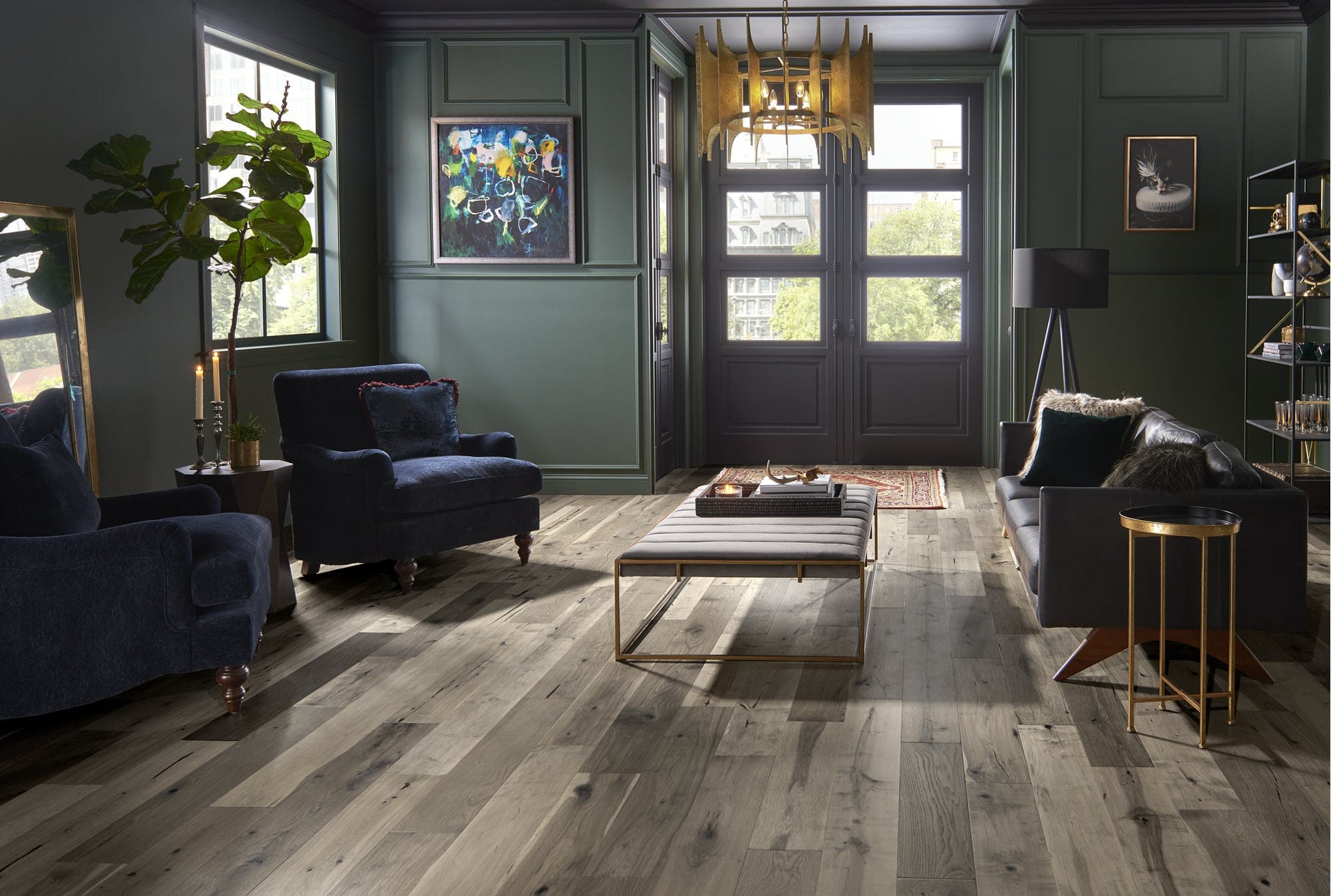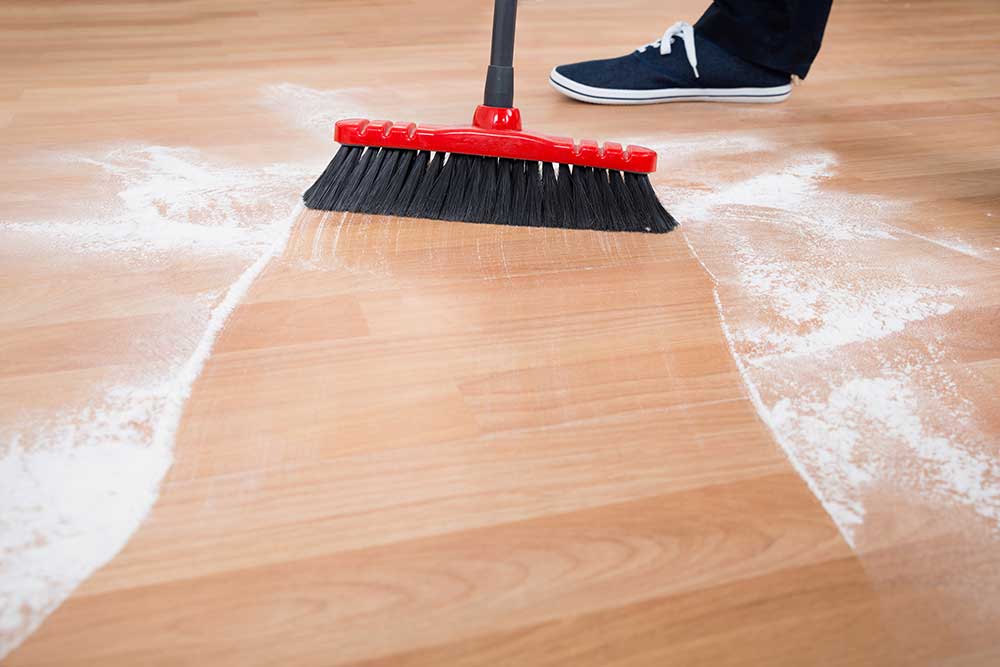Avoid using straight ammonia on hardwood floors as it can dull or scratch the finish. Instead, opt for safe and gentle cleaners that are specifically designed for hardwood surfaces to maintain the integrity and shine of your floors.
Using ammonia or other harsh chemicals may cause irreversible damage to your beautiful hardwood floors, so always choose products that are gentle and safe for your wood surfaces. When cleaning your floors, it is essential to prioritize the longevity and appearance of the wood by selecting appropriate cleaning solutions that are effective yet gentle on the surface.
By following these guidelines, you can ensure that your hardwood floors remain in top condition for years to come.
1. The Dangers Of Using Ammonia On Hardwood Floors
When using ammonia on hardwood floors, one must be aware of the potential dangers it poses to the flooring.
1.1 Discoloration And Deterioration
Ammonia can discolor the surface of hardwood floors, leading to an unsightly appearance over time. It may also deteriorate the finish, causing irreversible damage.
1.2 Etching And Removal Of Sheen
Using ammonia on hardwood floors can etch into the finish, creating permanent marks that mar the beauty of the flooring. Furthermore, it can remove the sheen of the wood, leaving it looking dull and lifeless.
2. Alternatives For Safe Cleaning Of Hardwood Floors
2. Alternatives for Safe Cleaning of Hardwood Floors
When it comes to maintaining the beauty of hardwood floors, using safe cleaning alternatives is crucial.
2.1 Bona Hardwood Floor Cleaner
Bona Hardwood Floor Cleaner is a trusted solution specifically formulated for hardwood floors.
2.2 Rejuvenate All Floors Restorer
Rejuvenate All Floors Restorer is a powerful cleaner that restores shine and vitality to hardwood floors.
2.3 Quick Shine High Traffic Hardwood
Quick Shine High Traffic Hardwood is an excellent option for high-traffic areas, keeping your floors looking pristine.
2.4 Method Squirt + Mop Wood Floor Cleaner
Method Squirt + Mop Wood Floor Cleaner offers a convenient and effective way to clean hardwood floors with ease.
2.5 Murphy Oil Soap
Murphy Oil Soap is a gentle yet powerful cleaner that helps maintain the natural beauty of hardwood floors.
3. Professional Recommendations For Hardwood Floor Cleaning
3. Professional Recommendations for Hardwood Floor Cleaning
3.1 Best Practices From Professionals
When it comes to cleaning hardwood floors, following the best practices recommended by professionals is crucial to maintaining the floor’s luster and longevity.
- Regularly sweep and vacuum the floor to remove dirt and debris, preventing scratches and damage.
- Use a damp mop with a gentle, pH-neutral cleaner specifically formulated for hardwood floors to remove stubborn stains and grime.
- Wipe up spills immediately to prevent moisture damage and warping of the wood.
- Consider using protective mats in high-traffic areas to minimize wear and tear.
3.2 What Not To Use On Hardwood Floors
It’s equally important to know what not to use on hardwood floors to avoid damaging the finish and overall appearance of the flooring.
- Avoid using straight ammonia, alkaline products, or abrasive cleaners as they can dull or scratch the finish.
- Refrain from relying on lemon juice or vinegar-and-water solutions, as these can also damage hardwood floors.
- Steam cleaners should be avoided, as excessive moisture can potentially warp or cup the wood.

Credit: www.maramani.com
4. Addressing Cloudy Wood Floors Caused By Ammonia
Ammonia is a popular cleaning agent that people often turn to when they want to remove tough stains and grime. However, when it comes to hardwood floors, using ammonia can cause more harm than good. This powerful chemical can discolor, deteriorate, and dull the finish of your wood floors, leaving them looking cloudy and unattractive. If you’ve made the mistake of using ammonia on your hardwood floors and now they appear hazy, don’t worry. There are solutions to address this issue and bring back the natural beauty of your floors. In this section, we will explore how to address haze buildup and refinishing options for damaged wood floors caused by ammonia.
4.1 How To Address Haze Buildup
If your hardwood floors have developed a cloudy appearance due to ammonia use, it’s essential to address the haze buildup and restore their shine. Here are some steps you can take to tackle this problem:
- Stop using ammonia: The first and most crucial step is to stop using ammonia or any other harmful cleaning agents on your wood floors. Continuing to use them will only worsen the haze and potentially damage the wood further.
- Gentle cleaning: Start by thoroughly cleaning your floors using a mild, pH-neutral cleaner specifically designed for hardwood floors. This will help remove any residue left behind by the ammonia and other harsh chemicals.
- Vinegar and water solution: You can create a safe and effective cleaning solution by mixing equal parts of vinegar and water. Dampen a mop or cloth with this solution and gently clean the cloudy areas of your wood floors.
- Buffing: If the haze persists, you can try buffing the affected areas using a soft cloth or a buffing pad. This process helps to remove any remaining residue and restore the shine of your floors.
- Polishing: Once the haze is removed, consider applying a high-quality wood floor polish or wax to protect and enhance the appearance of your hardwood floors. Make sure to follow the manufacturer’s instructions for the best results.
By following these steps, you can effectively address haze buildup on your hardwood floors caused by ammonia. However, if the damage is extensive and the haze does not improve, you may need to consider refinishing your wood floors.
4.2 Refinishing Options For Damaged Wood Floors
When ammonia has caused significant damage to your hardwood floors, refinishing becomes necessary. Here are some options you can consider:
- Sanding and restaining: If the finish of your wood floors is severely damaged, you may need to sand down the surface to remove the existing finish and stain. After sanding, you can apply a new stain and finish to restore the natural beauty of the wood.
- Professional refinishing: If you’re not comfortable with or lack the expertise to refinish your wood floors yourself, it’s best to hire a professional refinishing service. They have the necessary tools, knowledge, and experience to ensure your floors are refinished correctly and look their best.
- Partial refinishing: In some cases, the damage caused by ammonia may be limited to specific areas of the wood floors. In such situations, you can opt for partial refinishing, where only the affected areas are addressed. This can be a more cost-effective solution.
Remember, refinishing your hardwood floors is a significant undertaking and should be approached with caution. If you’re unsure about the best course of action, it’s always recommended to consult with a professional to assess the extent of the damage and provide suitable refinishing options.
Credit: akirby.co.uk
5. Safe And Effective Cleaning Solutions For Maintaining Luster
Clean your hardwood floors without risking damage by avoiding ammonia and other harsh cleaners. Instead, opt for safe and effective solutions like Bona Hardwood Floor Cleaner or a vinegar and water solution to preserve the luster and shine of your floors.
5.1 Using Ammonia Wisely
Ammonia on hardwood floors can be a controversial topic. While ammonia is a powerful cleaning agent, it can cause damage to the finish of your floors if used incorrectly. Using ammonia wisely is crucial to maintain the luster of your hardwood floors.
Here are a few tips on how to use ammonia safely and effectively:
- Always dilute the ammonia: Never use straight ammonia on your hardwood floors. Mix a small amount of ammonia with water to create a gentle cleaning solution.
- Test in an inconspicuous area: Before using the ammonia solution on your entire floor, test it in a small, hidden spot to ensure it doesn’t cause any discoloration or damage.
- Use a soft mop or cloth: Avoid using abrasive scrub brushes or rough materials when applying the ammonia solution. A soft mop or cloth will help prevent scratching or dulling the finish.
5.2 Safe Diy Cleaning Solutions
If you prefer to avoid ammonia altogether, there are safe DIY alternatives that can effectively clean and maintain the luster of your hardwood floors. These homemade solutions are simple to make using common household ingredients.
| Solution | Ingredients |
|---|---|
| Vinegar Solution | 1 cup white vinegar 1 gallon warm water |
| Lemon Juice Solution | 1/2 cup lemon juice 1 gallon warm water |
| Olive Oil Solution | 1/4 cup olive oil 1/4 cup white vinegar 1 gallon warm water |
When using these DIY solutions, follow these guidelines:
- Avoid using excess liquid: Too much moisture can damage your hardwood floors, so wring out your mop or cloth well before cleaning.
- Test in a small area: Similar to using ammonia, it’s important to test the DIY solution in a hidden spot before applying it to the entire floor.
- Gently clean: Use a soft mop or cloth to gently clean your hardwood floors, avoiding any rough materials that could cause scratches.
By using ammonia wisely or opting for safe DIY cleaning solutions, you can effectively maintain the luster of your hardwood floors without risking damage to the finish. Remember to always test any cleaning solution in an inconspicuous area and to use gentle techniques to protect the beauty of your floors.

Credit: www.mannington.com
Frequently Asked Questions On Ammonia On Hardwood Floors
Can You Put Ammonia On Hardwood Floors?
Avoid using ammonia on hardwood floors as it can dull or scratch the finish. Stick to gentle cleaners.
What Does Ammonia Do For Floors?
Ammonia can discolor, etch into the finish, and remove the sheen on floors. Avoid using it on hardwood floors as it can harm the surface.
What Is The Best Thing To Use To Clean Wood Floors?
The best thing to clean wood floors is a pH-neutral cleaner specifically made for wood floors. Avoid using ammonia, abrasive cleaners, or alkaline products as they can damage the wood finish. Stick to gentle solutions for safe and effective cleaning.
How Do You Strip Wood Floors With Ammonia?
Avoid using ammonia to strip wood floors as it can discolor, deteriorate, and dull the finish. Opt for safer alternatives like specialized wood floor cleaners to preserve the beauty and longevity of your hardwood floors.
Conclusion
In sum, while cleaning hardwood floors, it’s crucial to avoid using ammonia as it can cause discoloration and damage the finish. Opt for gentle, wood-friendly cleaning products and methods instead to keep your floors looking their best. By being mindful of your cleaning routine, you can maintain the longevity and appearance of your hardwood floors.


